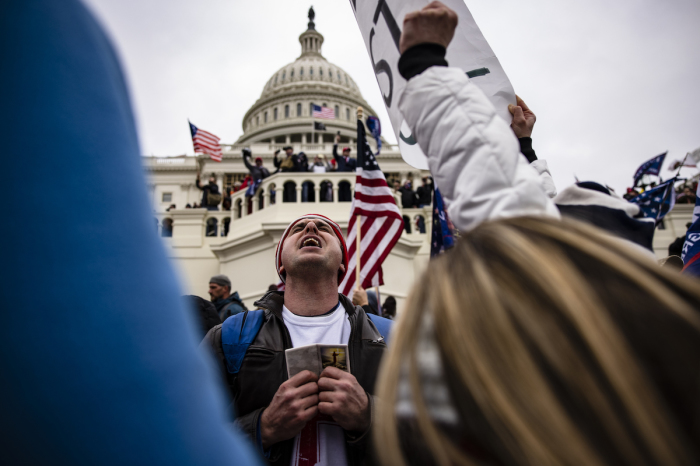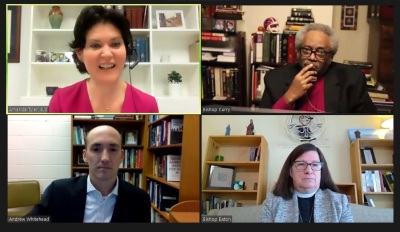Majority of evangelicals sympathize with, back Christian nationalism: researcher

While Christian nationalism is found in all sectors of society, evangelical Protestants are more likely than any other religious group to sympathize with and accept it, according to notable academic researcher Andrew Whitehead.
An associate professor of Sociology at Indiana University Purdue University-Indianapolis, Whitehead was part of a webinar titled “Democracy and Faith Under Siege: Responding to Christian Nationalism,” which took place on Wednesday. He shared polling information about the extent to which people in the United States sympathized with the worldview and moral framework of Christian nationalism.
Whitehead defined Christian nationalism as a “cultural framework that idealizes and advocates a fusion of Christianity with American civic life,” with Christianity in this case being more cultural and tribal than spiritual.
He divided Americans into four categories, including "rejecters," those who completely reject Christian Nationalism; "resisters," those who mostly reject it but hold some sympathies; "accommodators," those who sympathize with it but do not fall into the category: and "ambassadors," who largely if not completely accept Christian Nationalism.
Whitehead and his fellow researcher, Samuel L. Perry, associate professor of Sociology at the University of Oklahoma, found that nearly 20% of Americans were ambassadors, while 32.1% were accommodators, 26.56% were resisters, and 21.52% were rejecters.
Rather than being monolithic, Whitehead explained that there were high numbers of accommodators and ambassadors from diverse religious and regional backgrounds.
For example, accommodators are the major classification for four out of five educational groups, namely “less than high school,” “high school graduate,” “some college,” and “college graduate,” while “post-graduate” respondents were slightly more likely to be ambassadors than “college graduates.”
Also, while evangelical Protestants had the largest percentage of ambassadors than all the other religious categories, black Protestants and Catholics had higher percentages of accommodators than evangelical Protestants.

“We see that almost 80% of evangelical Protestants are at least accommodators or ambassadors of Christian Nationalism, so very prevalent,” said Whitehead.
“But even in mainline Protestantism, we see that over 30% are accommodators and just under 20% are ambassadors, so half of mainline Protestants in the U.S. are, again, friendly towards Christian nationalism.”
Whitehead mentioned the presence of Christian nationalism at the Jan. 6 riot on Capitol Hill in Washington, D.C., showing photos from the protest of a group of people praying before a large cross and others holding “Jesus 2020” signs.
“In order to make sense of this riot, while Christian nationalism is not the only explanation, it is a key part of understanding what took place,” said Whitehead.
“Christian nationalism is pervasive across all segments of U.S. society, within different religious traditions as well, and is influential in shaping Americans’ behaviors and attitudes,” he concluded.
“So it is absolutely a threat to a pluralistic, democratic society and something that needs to be wrestled with in order to move forward and not repeat the events of January 6.”
The webinar also featured comments from the Most Rev. Michael Curry, presiding bishop of The Episcopal Church, and the Rev. Elizabeth A. Eaton, presiding bishop of the Evangelical Lutheran Church in America.
During his remarks, Bishop Curry said he believes that there are “innocent forms of Christian nationalism,” pointing to an example from his childhood in the 1960s.
Curry explained that at his childhood church, there were many members who came from the West Indies and so some disputed whether the sanctuary should display the American flag or the United Kingdom flag.
“The compromise was that both the American flag and the Union Jack were both put up on a balcony,” he recalled. “They weren’t up front where the altar was.”
After reiterating that this was “probably, fairly innocent,” Curry then talked about “the more virulent or dangerous kind” that involves people viewing their country as the best out of believing they are “God’s favorite.”
“That borders on blasphemy, idolatry,” argued Curry. “That kind of nationalism is dangerous. It is dangerous to civic health; it is dangerous to the health of Christianity.”
Amanda Tyler, executive director of the Baptist Joint Committee for Religious Liberty, moderated the webinar panel, describing Christian nationalism in her introductory remarks as a “troubling ideology that was on the rise and that threatens religious freedom for all.”
“Christian nationalism is not new, but the frequency of violent acts inspired by Christian nationalism and a resurgent in attempts to legislate and govern from a position infused with Christian nationalism has been on a dramatic uptick in recent years,” she stated.
“We believe that Christians bear a special responsibility to understand and to root out Christian nationalism, not just in its most obvious and extreme forms, but in the pervasive, deeply ingrained manifestations in our culture, our churches, and ourselves.”
The webinar was hosted by the website Christians Against Christian Nationalism, which features a statement signed by more than 19,000 individuals.
While some have argued that American churches need to tackle Christian nationalism, others have argued that the phrase was a way to marginalize conservative Christians.
In a Breakpoint column, John Stonestreet, president of the Colson Center for Christian Worldview, and Timothy D. Padgett argued that Christian nationalism was being used as “a scare label to dismiss any policy or person more conservative than whoever is using the term.”
As an example, they pointed to a recent article by the United Kingdom-based publication The Guardian quoting experts as saying assorted proposed pro-life bills were “Christian nationalist” in nature.
“As seen in The Guardian, we’re all but guaranteed for the near future that anything vaguely traditional or moral, and any appeal to anything higher than the latest cultural fad, will be smeared with this label. It’s silly. Even more, it’s dangerous,” they wrote.
“Even so, Christians must not abandon the public square just because people say mean things about us.”




























